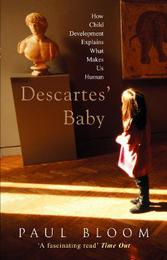
|
Descartes' Baby: How Child Development Explains What Makes Us Human
Paperback / softback
Main Details
| Title |
Descartes' Baby: How Child Development Explains What Makes Us Human
|
| Authors and Contributors |
By (author) Paul Bloom
|
| Physical Properties |
| Format:Paperback / softback | | Pages:288 | | Dimensions(mm): Height 198,Width 129 |
|
| Category/Genre | Popular psychology |
|---|
| ISBN/Barcode |
9780099437949
|
| Classifications | Dewey:153 |
|---|
| Audience | |
|---|
|
Publishing Details |
| Publisher |
Cornerstone
|
| Imprint |
Arrow Books Ltd
|
| Publication Date |
7 July 2005 |
| Publication Country |
United Kingdom
|
Description
A striking exploration of how new approaches to child development can illuminate our understanding of the feelings and beliefs that show us at our most human - humour, disgust, art, religion and morality - by 'the wunderkind of his generation of cognitive scientists' (Steven Pinker) Why is a forgery worth so much less than an original work of art? What's so funny about someone slipping on a banana peel? Why, as Freud once asked, is a man willing to kiss a woman passionately, but not use her toothbrush? And how many times should you baptize a two-headed twin? Descartes' Baby answers such questions, questions we may have never thought to ask about such uniquely human traits as art, humour, faith, disgust, and morality. In this thought-provoking and fascinating account of human nature, psychologist Paul Bloom contends that we all see the world in terms of bodies and souls. Even babies have a rich understanding of both the physical and social worlds. They expect objects to obey principles of physics, and they're startled when things disappear or defy gravity. They can read the emotions of adults and respond with their own feelings of anger, sympathy and joy. This 'dualist' perspective remains with us throughout our lives. Using his own researches and new ideas from philosophy, evolutionary biology, aesthetics, theology, and neuroscience, Bloom shows how this way to making sense of reality can explain what makes us human. The myriad ways that our childhood views of the world undergo development throughout our lives and profoundly influences our thoughts, feelings, and actions is the subject of this richly rewarding book.
Author Biography
Paul Bloom is Professor of Psychology at University of Toronto and the Brooks and Suzanne Ragen Professor Emeritus of Psychology at Yale University. His research explores the psychology of morality, identity and pleasure. Bloom is the recipient of multiple awards and honours, including most recently the million-dollar Klaus J. Jacobs Research Prize. He has written for scientific journals such as Nature and Science, and for the New York Times, New Yorker, Atlantic and Guardian. He is the author or editor of eight books, including Just Babies, How Pleasure Works, Descartes' Baby, Against Empathy and most recently The Sweet Spot.
Reviews'Lifts some weighty concepts with a lightness of touch. It's genuinely thoughtful and thought-provoking, rather than some wearingly trivial pop psychology book about how cute babies are.' -- Mil Millington * Observer's Summer Reading * 'This gem of a book explains how people can be so smart but at the same time construe the world in seemingly bizarre ways. Descartes' Baby is crystal clear, gracefully written, and filled with fascinating observations.' -- Steven Pinker 'Simple and compelling... Bloom illuminates his arguments with fascinating case histories... Along the way Bloom offers psychological insight into all manner of puzzling questions... Bloom's underlying philosophical aims are profound... We stand on the brink of a new era of self-discovery.' * The Times *
|